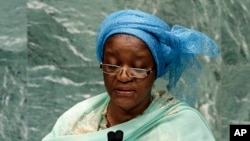NAIROBI —
Somalia’s new government has to build a stronger and more transparent judicial system in order to prosecute perpetrators of sexual violence against women, according to a senior United Nations official. The call comes as Somali government officials, judges and diplomats deliberate on how to enhance the country’s judiciary.
Speaking in Nairobi Thursday, the United Nations special representative for sexual violence in conflict, Zainab Hawa Bangura, called on the Somali government to protect and improve security of internally displaced people living in camps in and around Mogadishu.
She said victims of sexual violence need to know they will be safe if they report criminals to the authorities.
“Most important of all is trust in the system," said Bangura. "Once they see they get justice a first example, a second example, a third example, and then they will have faith in the system.”
The government faced international pressure this year following the arrest of a woman who claimed she was raped by soldiers while she was living in a camp in Mogadishu. A journalist who interviewed her was also arrested. Both have since been released.
In an 80-page report released last month, Human Rights Watch accused Somali government forces and armed militias of committing widespread abuses against displaced Somalis who have arrived in Mogadishu since 2011 fleeing famine and conflict.
The report said instead of finding a safe haven, many displaced Somalis who came to camps in government-controlled areas have found hostility and abuse.
Bangura says it’s hard to know who is actually abusing these women in the camps since all the civilians, government forces and armed militias live in the same place.
“We have 513 camps, in these camps you have militias living with the people - that’s a big problem," she said. "And then you have military forces and police and everybody else who live in these camps. Obviously, you never know who is committing the rape. Because the militias are there, uniforms are literally the same. People buy them from anywhere.”
Meanwhile, on Monday, the Somali president opened a conference on judicial reforms, where he called on participants to come up with ways the country can build a full and functioning judicial system that is trusted by all Somalis.
Speaking in Nairobi Thursday, the United Nations special representative for sexual violence in conflict, Zainab Hawa Bangura, called on the Somali government to protect and improve security of internally displaced people living in camps in and around Mogadishu.
She said victims of sexual violence need to know they will be safe if they report criminals to the authorities.
“Most important of all is trust in the system," said Bangura. "Once they see they get justice a first example, a second example, a third example, and then they will have faith in the system.”
The government faced international pressure this year following the arrest of a woman who claimed she was raped by soldiers while she was living in a camp in Mogadishu. A journalist who interviewed her was also arrested. Both have since been released.
In an 80-page report released last month, Human Rights Watch accused Somali government forces and armed militias of committing widespread abuses against displaced Somalis who have arrived in Mogadishu since 2011 fleeing famine and conflict.
The report said instead of finding a safe haven, many displaced Somalis who came to camps in government-controlled areas have found hostility and abuse.
Bangura says it’s hard to know who is actually abusing these women in the camps since all the civilians, government forces and armed militias live in the same place.
“We have 513 camps, in these camps you have militias living with the people - that’s a big problem," she said. "And then you have military forces and police and everybody else who live in these camps. Obviously, you never know who is committing the rape. Because the militias are there, uniforms are literally the same. People buy them from anywhere.”
Meanwhile, on Monday, the Somali president opened a conference on judicial reforms, where he called on participants to come up with ways the country can build a full and functioning judicial system that is trusted by all Somalis.









